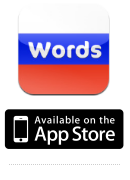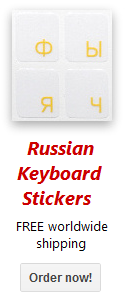 FR FR |
About us | Home | User agreement | Link to us |
Usage of Russian Verbs
As you may know already, there are three tenses (present, past, future) and two aspects (imperfective, perfective) in Russian. The following table demonstrates how Russian verbs are used depending on their tense and aspect.
| TENSE AND ASPECT | USAGE | EXAMPLE SENTENCES |
| PAST TENSE, IMPERFECTIVE ASPECT | Used to designate an action that began and ended at a particular time in the past; the result is not important for the speaker | Вчера вечером он читал книгу. |
| Used for an action that occurred over period of time but was completed in the past; the action, not duration, is emphasized | Он плавал в бассейне весь день. | |
| Used for an activity that took place regularly in the past | Во время каникул мы ходили в кино каждое утро. | |
| Used for actions occurred over period of time simultaneously but were completed in the past | Когда я читал книгу, брат смотрел телевизор. | |
| Used when the result of an action is nullified, i.e. an opposite action occurred | В комнате холодно, потому что я открывал окно. (i.e. открыл и закрыл) | |
| Used for an action that occurred over period of time but was completed in the past. The duration is emphasized | Он строил дом целый месяц. | |
| PAST TENSE, PERFECTIVE ASPECT | Used to emphasize the result of an action that began and ended at a particular time in the past | Вчера вечером я прочитал книгу от начала до конца. |
| Used for a past action that had a result before another past action that also had a result | Когда мы пришли в
класс, учитель уже ушёл домой.
Мы успели сыграть партию в шахматы до того, как пришёл Андрей. |
|
| Used when the result of an action remains | Он надел новую рубашку. (i.e. он надел и сейчас она надета) | |
| Used to designate an action that began and ended at a particular time in the past; the time during which the result was achieved is emphasized | Он построил дом за месяц. | |
| PRESENT TENSE, IMPERFECTIVE ASPECT | Used for a present state of affairs | Андрей живёт в Москве. |
| Used for a general fact | Волга впадает в
Каспийское море.
Солнце встаёт на востоке. |
|
| Used for habitual actions | Каждое утро он читает газеты. | |
| Used for future timetables and arrangements | Поезд отходит в
12:00.
Решено. Мы идём в кино. |
|
| Used for a specific action that is occurring | На улице идёт сильный дождь. | |
| Used for an activity that takes place over period of time specified | Они играют в теннис уже 2 часа. | |
| FUTURE TENSE, IMPERFECTIVE ASPECT | Used for an action that will be ongoing or repeated at a particular time in the future, but it is not known whether will be finished or not | Завтра утром я буду играть в теннис.
Вечером она будет готовить ужин. |
| FUTURE TENSE, PERFECTIVE ASPECT | Used for an action that will be finished at a particular time in the future | Скоро он узнает хорошие новости.
Вечером она приготовит ужин. |
Lessons on Russian Verbs
Got questions?
Ask them in the Russian Questions and Answers — a place for students, teachers and native Russian speakers to discuss Russian grammar, vocabulary, pronunciation, and other aspects of the Russian language.
Copyright 2001-2026 MasterRussian.com | Privacy Policy | Contact Us
 Russian Lessons
Russian Lessons
- Russian alphabet
- Names of letters
- Russian Q&A new
- Pronunciation: Cons.
- Pronunciation: Vowels
- Noun Gender/Number
- Cases of Nouns
- Russian Greetings
- Personal Pronouns
- Learning Russian
- 1000 Common Words
- 500 Russian Verbs
- Top Russian Nouns
- » All lessons
- » Guest lessons
 Browse Topics
Browse Topics
- Start learning Russian
- Forum
- Bookstore
- Dictionaries
- Russian - basic
- Russian - adv
- Pronunciation
- Russian Blog new
- Reading
- Test & quizzes
- Translation
- Verbs
- Verb Conjugations
- Russian numbers
- Russian Tests new
- Vocabulary
- Writing
- Folk music
- Fun stuff
- Leo Tolstoy
- Learner's lore
- Literature
- Personal blogs
- Picture Dictionary new
- Proverbs
- Publications
- Radio & TV
- Russian culture
- Schools in Russia
- Russian Words
- Russian names
- Software
- Russian Words iPhone
Clicks the "Like" button below to get daily updates on Facebook!
Click "Add to circles" to learn Russian on Google+

Search MasterRussian

English » Russian dictionary

WORD OF THE DAY
![]() RSS
|
iGoogle
|
My Yahoo!
RSS
|
iGoogle
|
My Yahoo!
Meaning: face, front, countenance
Pronunciation: [lee-TSOH]
Learn Russian words! »
TODAY'S STREET SIGN

Russian: Аптека
English: Drug store
FOLLOW US ON TWITTER

MasterRussian on Twitter


